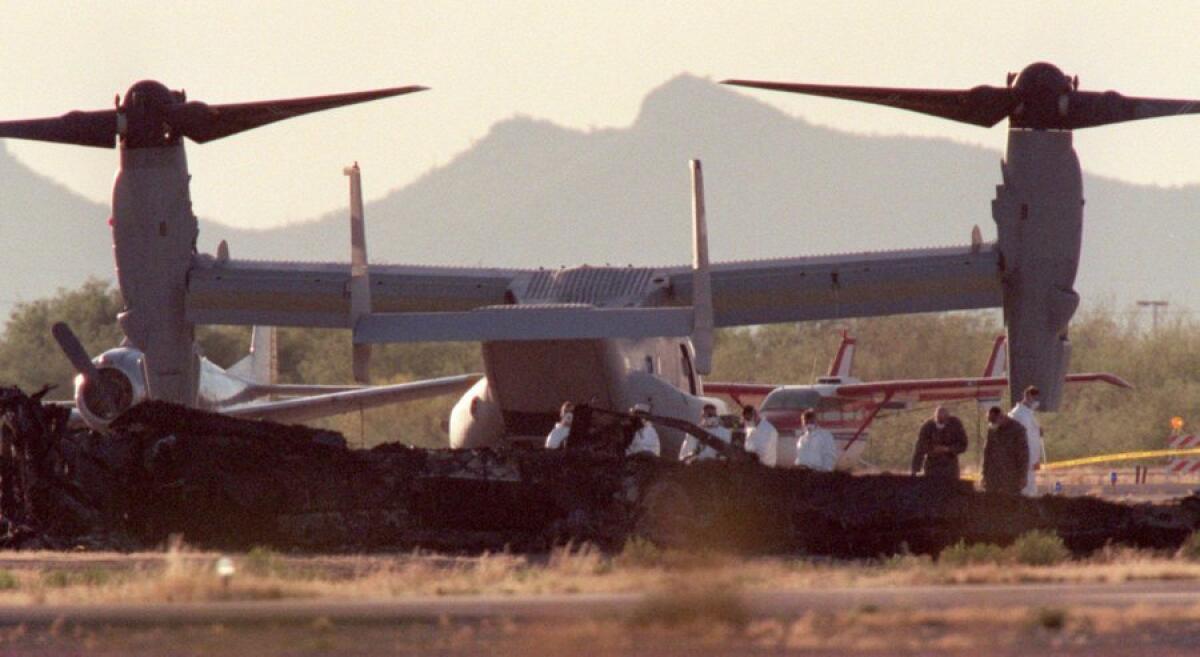Widows of Marine pilots win battle to vindicate husbands 16 years after air crash

In April 2000, investigators work near an MV-22 Osprey at Avra Valley Airport in Marana, Ariz.
Widows of two Marine Corps pilots have won a 16-year fight to lift blame from their husbandsâ shoulders for a 2000 Osprey crash that killed 19 people, including 15 Marines from San Diego County.
Test pilots Lt. Col. John Brow and Maj. Brooks Gruber were at the controls of the MV-22 aircraft when it crashed in the Arizona desert during an exercise.
The revolutionary aircraft â which travels like an airplane but lands vertically like a helicopter â was still in the operational evaluation stage. The Marine Corps had money and time invested in the controversial airframe, which at one point had enemies as high as then-Defense Secretary Dick Cheney, who tried to kill the program in the early 1990s.
Marine officials viewed the Osprey, with its speed and maneuverability, as a game changer for the battlefield â and eventually the aircraft did prove itself in Afghanistan by moving troops quickly in and out of harmâs way.
U.S. Rep. Walter B. Jones (R-N.C.), who championed the widowsâ cause, said the Marine Corps pushed blame on the pilot and co-pilot in 2000 because it needed the troubled program to continue and succeed.
âIt was too easy to let the blame be on those who canât defend themselves, so the plane canât be blamed and the software canât be blamed,â Jones said this week.
His efforts finally paid off in February. Thatâs when Deputy Secretary of Defense Robert Work, a retired Marine officer, wrote a letter acknowledging that âitâs impossible to point to a single âfatal factorâ that caused this crash.â
Gruberâs widow, Connie, said the letter settles an injustice.
âItâs just a burden lifted. Because for all these years, weâve had to feel the weight of, not only did they cause their own deaths, but the deaths of 17 other Marines. That was hard to bear,â she said from her home in North Carolina.
âThey could not rest in peace until this record was set straight.â
Browâs widow, Trish, still lives outside Patuxent River, Md., a hub of naval aviation. She said she was treated differently for years by other military families, including people who would hear her name and turn away.
âI can go on base with my head held high,â Brow said last week.
The anniversary of the deaths was April 8, and the sting was slightly softened this year.
âItâs not quite as painful. Thereâs not quite the injustice,â said Brow, whose sons were 7 and 8 when their father died. âWe still miss him every day.â
Itâs a hard-won reversal, and not an everyday occurrence in the annals of American military aviation.
âI would think it is very rare,â said Bob Butcher, a retired Marine major general who is chairman of the Flying Leathernecks Aviation Museum foundation in San Diego.
Killed in the crash were 14 young Camp Pendleton Marines from the 3rd Battalion, 5th Marine Regiment, and one stationed at Miramar Marine Corps Air Station. They were Sgt. Jose Alvarez, 28; Pfc. Gabriel C. Clevenger, 21; Pfc. Alfred Corona, 23; Lance Cpl. Jason T. Duke, 28; Lance Cpl. Jesus Gonzalez Sanchez, 27; Lance Cpl. Seth G. Jones, 18; 2nd Lt. Clayton J. Kennedy, 24, platoon commander; Lance Cpl. Jorge A. Morin, 21; Cpl. Adam C. Neely, 22; Pfc. Kenneth O. Paddio, 23; Pfc. George P. Santos, 19; Pfc. Keoki P. Santos, 24; Cpl. Can Soler, 21; Pvt. Adam L. Tatro, 19; and Cpl. Eric J. Martinez, 21.
The two remaining members of the Osprey crew were Cpl. Kelly S. Keith, 22, and Staff Sgt. William B. Nelson, 30.
The Marine Corps referred request for comment on Workâs letter to the Defense secretaryâs office.
In a written statement, the Marine headquarters only expressed sadness for the losses.
âThis was a tragic event that occurred nearly 16 years ago, and we continue to mourn the loss of our Marines, as we have every day since the event,â the release said.
Steele writes for the San Diego Union-Tribune.
More to Read
Sign up for Essential California
The most important California stories and recommendations in your inbox every morning.
You may occasionally receive promotional content from the Los Angeles Times.










